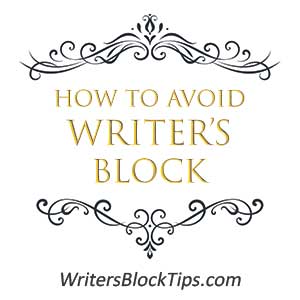How to Avoid Writer’s Block – How to Fight Writer’s Block
 Writer’s block is a challenge that can derail even the most experienced writers, leading to frustration and a loss of momentum. The good news is that with intentional habits, strategies, and mental preparation, it’s possible to avoid writer’s block altogether or significantly reduce its impact on your creative process. By setting yourself up for success and fostering a productive writing environment, you can keep your creative flow steady and your projects on track.
Writer’s block is a challenge that can derail even the most experienced writers, leading to frustration and a loss of momentum. The good news is that with intentional habits, strategies, and mental preparation, it’s possible to avoid writer’s block altogether or significantly reduce its impact on your creative process. By setting yourself up for success and fostering a productive writing environment, you can keep your creative flow steady and your projects on track.
In this article, we’ll explore practical approaches to help writers avoid writer’s block, maintain their focus, and enjoy a consistent flow of creativity. Created by a former literary agent who’s helped 400+ authors get literary agents and/or traditional book publishers as an author coach/consultant, this article is part of a guide about How to Get Through Writer’s Block.
Develop a Consistent Writing Routine
One of the most effective ways to avoid writer’s block is to establish a consistent writing routine. Regular writing sessions create a habit that conditions your brain to be ready to write at specific times.
Benefits of a Routine
- Builds Discipline: Writing becomes part of your daily rhythm, reducing procrastination.
- Reduces Pressure: Knowing you have scheduled time to write alleviates stress about finding time.
- Encourages Momentum: Writing regularly helps you stay connected to your project, making it easier to pick up where you left off.
Tips for Creating a Routine
- Choose a time of day when you feel most creative and alert.
- Start with manageable goals, such as 30 minutes or 500 words per session.
- Keep distractions to a minimum by turning off notifications and finding a quiet space.
Prioritize Preparation and Planning
A lack of direction often contributes to writer’s block. By planning your writing projects in advance, you can minimize uncertainty and set yourself up for success.
Outlining Your Work
Creating an outline helps you break your project into smaller, manageable sections. This provides a clear roadmap, reducing the chances of feeling overwhelmed.
- For fiction: Outline key plot points, character arcs, and settings.
- For nonfiction: List main topics, subtopics, and supporting arguments.
Research in Advance
Having your research ready before you start writing ensures you won’t waste time searching for information mid-draft. Organize your notes in a way that’s easy to reference, such as using folders or digital tools like Evernote.
Create an Inspiring Writing Environment
The environment where you write can greatly influence your productivity and creativity. A comfortable, inspiring space can help you avoid writer’s block by making writing sessions more enjoyable.
Optimize Your Workspace
- Lighting: Ensure your space is well-lit to reduce eye strain.
- Comfort: Use an ergonomic chair and desk setup to maintain physical comfort.
- Minimal Distractions: Keep your workspace tidy and free from non-essential items.
Personalize Your Space
Surround yourself with objects that inspire you, such as artwork, books, or plants. Playing soft background music or ambient sounds can also create a calming atmosphere.
Set Realistic Goals
Unrealistic expectations can lead to frustration and creative paralysis. To avoid writer’s block, set achievable goals that align with your capabilities and timeline.
Start Small
Begin with short-term goals, such as completing a chapter or writing for 20 minutes. Celebrate these milestones to build confidence.
Break Large Projects Into Steps
Dividing your project into smaller tasks makes it feel less daunting. For example, instead of aiming to “finish a novel,” focus on completing one scene or character profile at a time.
Track Your Progress
Use tools like writing journals, calendars, or apps to monitor your achievements. Seeing your progress can motivate you to keep going.
Stay Physically and Mentally Healthy
Physical and mental well-being play a significant role in maintaining creativity and avoiding writer’s block.
Prioritize Rest
- Sleep: A well-rested mind is more alert and creative. Aim for 7–8 hours of sleep per night.
- Breaks: Take regular breaks during writing sessions to avoid burnout. Use techniques like the Pomodoro method to manage your time effectively.
Exercise Regularly
Physical activity increases blood flow to the brain and boosts creativity. Even a short walk can refresh your mind and improve focus.
Maintain a Balanced Diet
Fuel your brain with nutritious foods, and stay hydrated to maintain energy levels and concentration.
Engage With Other Writers
Connecting with other writers can provide encouragement, accountability, and fresh perspectives, all of which help prevent writer’s block.
Join Writing Groups
Participating in local or online writing groups allows you to share ideas, receive feedback, and stay motivated.
Find a Writing Partner
A writing buddy can provide mutual support, encouragement, and accountability. Schedule regular check-ins to discuss your progress.
Attend Workshops or Conferences
Learning from other writers and industry professionals can inspire new ideas and techniques.
Experiment With Different Writing Techniques
Sticking to the same methods can sometimes lead to stagnation. Experimenting with different approaches can keep your creativity alive.
Change Your Writing Medium
Switching from typing to handwriting (or vice versa) can offer a fresh perspective. Try using a notebook, typewriter, or digital tablet.
Explore New Genres or Styles
Stepping outside your comfort zone by experimenting with different genres, tones, or formats can spark creativity.
Practice Freewriting
Freewriting involves writing continuously without worrying about grammar or structure. This exercise can help unlock ideas and break through mental barriers.
Learn to Embrace Imperfection
Perfectionism often leads to self-doubt, which can spiral into writer’s block. Accepting that your first draft doesn’t have to be perfect can free you to write without fear.
The Importance of First Drafts
Remember, first drafts are meant to be messy. Their purpose is to get your ideas on the page, not to produce a polished final product.
Focus on Progress Over Perfection
Celebrate small wins, such as completing a section or achieving your daily word count. Progress is more important than perfection in the early stages of writing.
Stay Curious and Inspired
Keeping your creative well filled is essential to avoiding writer’s block. Seek inspiration from the world around you and continue learning to fuel your imagination.
Read Widely
Read books, articles, and essays in various genres and subjects. Exposure to different writing styles and ideas can inspire your own work.
Engage With Other Art Forms
Explore visual arts, music, theater, or films to find new sources of inspiration. Sometimes, stepping away from writing can reignite your creativity.
Travel and Observe
Whether it’s a local park or a distant country, experiencing new environments can provide fresh perspectives and ideas.
Develop a Positive Mindset
Your mindset plays a significant role in avoiding writer’s block. A positive, resilient attitude can help you navigate challenges and maintain creativity.
Practice Gratitude
Focus on the aspects of writing that bring you joy, whether it’s the creative process, the opportunity to share your ideas, or the satisfaction of completing a project.
Reframe Challenges
View obstacles as opportunities to learn and grow rather than as failures. Adopting a growth mindset can help you approach writing with curiosity and openness.
Celebrate Successes
Acknowledge and celebrate your achievements, no matter how small. Recognizing your progress builds confidence and motivation.
Conclusion – How to Avoid Writer’s Block
Avoiding writer’s block requires a proactive approach that combines planning, self-care, and creative exploration. By developing a consistent routine, preparing effectively, and maintaining a positive mindset, you can set yourself up for sustained success as a writer.
Remember, writing is a journey, not a race. By embracing the process and implementing these strategies, you can minimize the impact of writer’s block and keep your creative momentum alive. Whether you’re crafting fiction, nonfiction, or poetry, the right habits and mindset will help you stay inspired and productive.
Now that you’ve read “How to Avoid Writer’s Block,” click here to read “Quotes About Writer’s Block.”

 This guide about
This guide about 